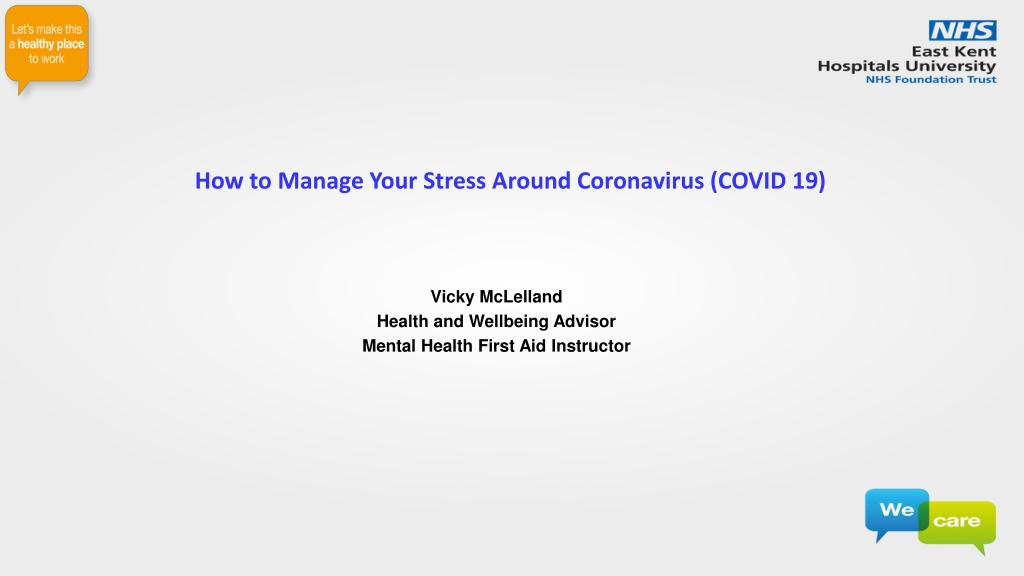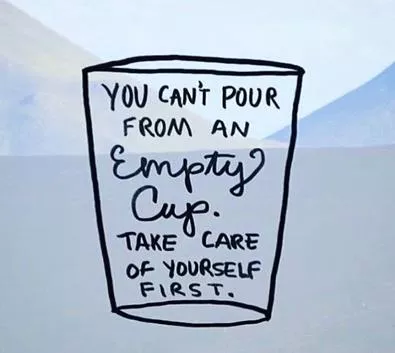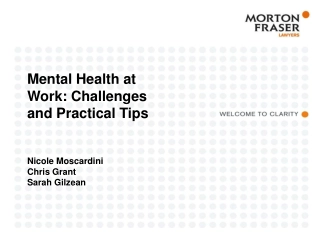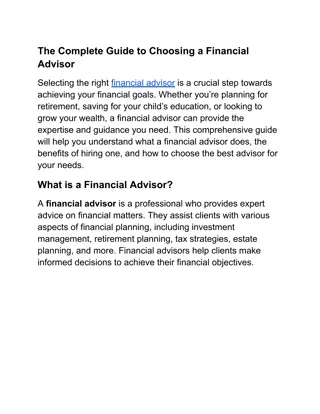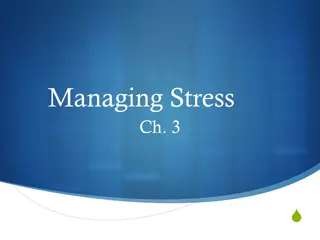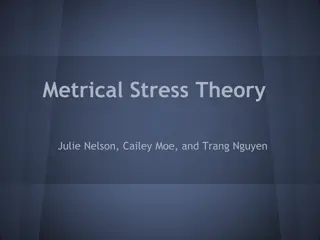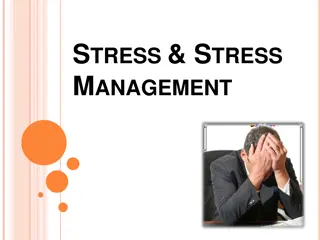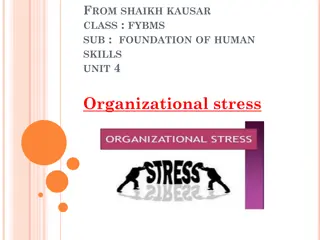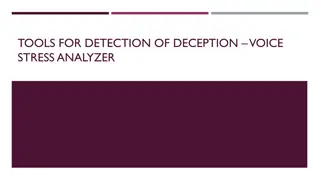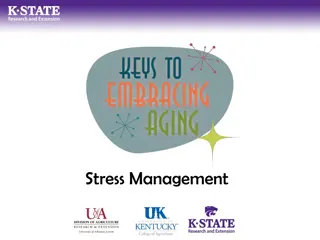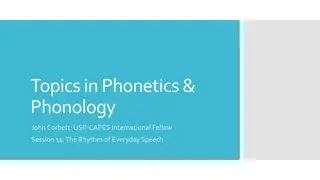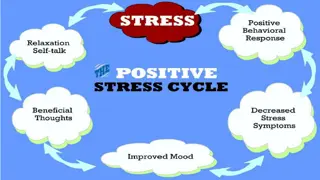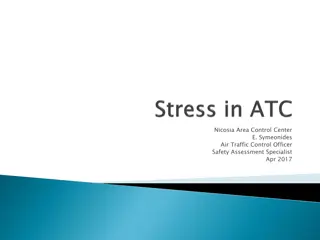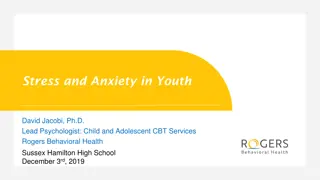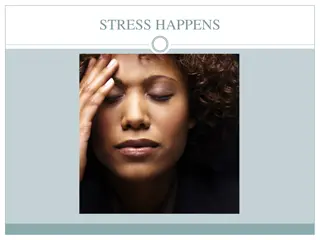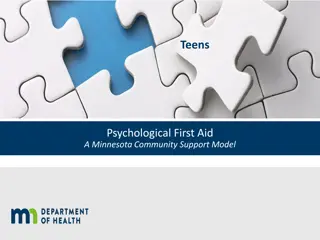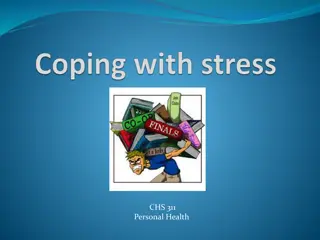Managing Stress Around Coronavirus: Tips from Health Advisor Vicky McLelland
Learn how to manage stress during the COVID-19 pandemic with insights from Health and Wellbeing Advisor Vicky McLelland. Discover ways to cope with anxiety, utilize the STOP practice for relaxation, and reduce stress through self-care and following recommended guidelines. Stay healthy and prioritize your well-being during these challenging times.
Download Presentation

Please find below an Image/Link to download the presentation.
The content on the website is provided AS IS for your information and personal use only. It may not be sold, licensed, or shared on other websites without obtaining consent from the author. Download presentation by click this link. If you encounter any issues during the download, it is possible that the publisher has removed the file from their server.
E N D
Presentation Transcript
How to Manage Your Stress Around Coronavirus (COVID 19) Vicky McLelland Health and Wellbeing Advisor Mental Health First Aid Instructor
Health is a state of complete physical, mental and social wellbeing and not merely the absence of disease or infirmity (World Health Organisation definition). It is important that you take care of you to make sure you stay healthy whether you are in your workplace, working from home/days off or self-isolating
Many people feel stressed, anxious and fearful about the effects of COVID 19 People working in the NHS are referred to as Heroes by the media Even Heroes feel fear! Fear can: - to be the best person you can be at this difficult time Lead to stress and anxiety or You can use it to give you strength and determination
Stress and Anxiety Both are survival reactions They are normal reactions to fear or worry Your body releases adrenaline and cortisol causing one of the following response Don t feel bad if you feel stressed or anxious about of COVID 19
If you feel very stressed or anxious try the STOP Practice You can do this anywhere and it can help you to relax and focus for a few minutes on stopping, but then continue focussing on what you were doing before. - Stop what you are doing - Take a few breaths slowly - Observe the breath in and out and anything else that comes into your awareness. Do not judge just observe. This may be your thoughts, emotions, your mood or physical feelings. Observe them and then release them, don t focus on them. - Release this practice and Proceed with the next thing that you have to do. Take time to notice how you feel after this short break.
How can you reduce your stress and anxiety? Follow the advice we have been given: If you have recent onset of a new continuous cough and/or high temperature self-isolate for 7 days from when your symptoms started Wash your hands more often than usual, for 20 seconds, using soap and hot water, particularly after coughing, sneezing and blowing your nose, or after being in public areas. To reduce the spread of germs when you cough or sneeze, cover your mouth and nose with a tissue, or your sleeve (not your hands) if you don t have a tissue, and throw the tissue in a bin immediately. Follow advice on social distancing stay 2 metres apart from people (except your family) when you are outside and only go out for essentials, one exercise a day and coming to work
Use exercise to manage your stress and anxiety Exercise has been shown to reduce stress and anxiety and maintain mental wellbeing You can go for one walk or run each day, away from home Or exercise in your home or in your garden Check out the One You website for ideas on working out at home: https://www.nhs.uk/oneyou/for-your-body/move-more/home-workout-videos/
If you are concerned about your anxiety or mental health Stop watching or listening to the news Try some relaxation exercises, go to: - https://www.ekhuft.nhs.uk/staff/work-life/health-and-wellbeing/mental-health-and-stress/ Try mindfulness meditation at the Headspace App or at work - https://www.ekhuft.nhs.uk/staff/work-life/health-and-wellbeing/mindfulness/ Check out the MIND website - https://www.mind.org.uk/information-support/coronavirus-and-your-wellbeing/
Improve your wellbeing and build your resilience to stress Exercise Take notice: Listen to the birds signing Learn something new Give kindness and support to colleagues who are struggling Connect through social media or phone calls Be compassionate to yourself
Be compassionate to yourself In health care we are good at being kind and compassionate to patients but not so good at being compassionate to ourselves You can use self-compassion when you feel anxious (or any emotion) to help you feel better To find a self-compassion meditation: https://www.ekhuft.nhs.uk/staff/work-life/health-and- wellbeing/mindfulness/mindful-self-compassion/ or https://self-compassion.org/guided-self-compassion-meditations-mp3-2/
Three Pillars of Good Health Sleep Healthy Diet Exercise Stress and anxiety make us less likely to sleep well If you are not sleeping, talk to your GP Try and ensure you are eating a healthy diet which can help to maintain your mental wellbeing You can check out this website for free if you work in the NHS and see what else will help your mental wellbeing: https://home.unmind.com/
Use Humour to Help You Cope Humour is a strength which helps to build resilience to stress NHS frontline staff know the value of humour Don t forget it when things get tough
Negative thinking about how this virus will affect our families and ourselves will increase stress and anxiety If you find yourself focusing on the negatives - stop and turn your thoughts to something positive Think of three things you are grateful for each morning Think of three positive things that have happened recently (it could be someone thanking you for something) Make your bed properly in the morning that way you have achieved something positive each day Turn the fear and anxiety into strength and perseverance
The greatest weapon against stress is our ability to choose one thought over another. William James
